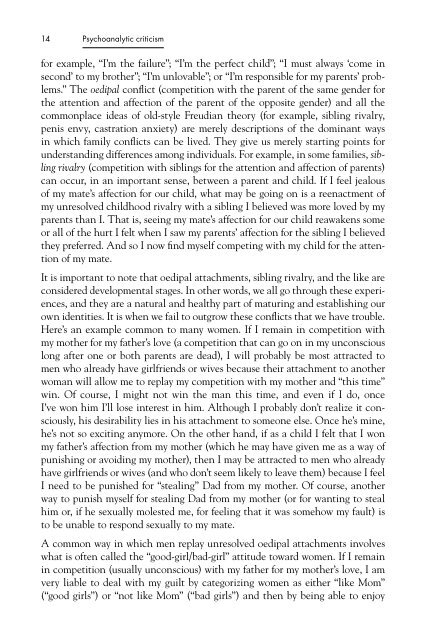- Page 2: critical theory today
- Page 5 and 6: Routledge Taylor & Francis Group 27
- Page 8 and 9: C o n t e n t s Preface to the seco
- Page 10 and 11: Contents ix 7 Structuralist critici
- Page 12 and 13: P r e f a c e t o t h e s e c o n d
- Page 14 and 15: P r e f a c e f o r i n s t r u c t
- Page 16: A c k n o w l e d g m e n t s My mo
- Page 19 and 20: Everything you wanted to know about
- Page 21 and 22: Everything you wanted to know about
- Page 23 and 24: Everything you wanted to know about
- Page 25 and 26: Everything you wanted to know about
- Page 27 and 28: 10 Everything you wanted to know ab
- Page 29: 12 Psychoanalytic criticism Freud (
- Page 33 and 34: 16 Psychoanalytic criticism alter t
- Page 35 and 36: 18 Psychoanalytic criticism of ego
- Page 37 and 38: 20 Psychoanalytic criticism Given t
- Page 39 and 40: 22 Psychoanalytic criticism theoris
- Page 41 and 42: 24 Psychoanalytic criticism Is it a
- Page 43 and 44: 26 Psychoanalytic criticism realizi
- Page 45 and 46: 28 Psychoanalytic criticism For Lac
- Page 47 and 48: 30 Psychoanalytic criticism if I wa
- Page 49 and 50: 32 Psychoanalytic criticism render
- Page 51 and 52: 34 Psychoanalytic criticism in resp
- Page 53 and 54: 36 Psychoanalytic criticism might b
- Page 55 and 56: 38 Psychoanalytic criticism respons
- Page 57 and 58: 40 Psychoanalytic criticism through
- Page 59 and 60: 42 Psychoanalytic criticism respons
- Page 61 and 62: 44 Psychoanalytic criticism “thou
- Page 63 and 64: 46 Psychoanalytic criticism and onl
- Page 65 and 66: 48 Psychoanalytic criticism woundin
- Page 67 and 68: 50 Psychoanalytic criticism Order a
- Page 69 and 70: 52 Psychoanalytic criticism Mitchel
- Page 71 and 72: 54 Marxist criticism philosophy, re
- Page 73 and 74: 56 Marxist criticism good medical i
- Page 75 and 76: 58 Marxist criticism While this vie
- Page 77 and 78: 60 Marxist criticism Rugged individ
- Page 79 and 80: 62 Marxist criticism an object’s
- Page 81 and 82:
64 Marxist criticism American histo
- Page 83 and 84:
66 Marxist criticism Before we exte
- Page 85 and 86:
68 Marxist criticism Some questions
- Page 87 and 88:
70 Marxist criticism the novel illu
- Page 89 and 90:
72 Marxist criticism “You see I t
- Page 91 and 92:
74 Marxist criticism without substa
- Page 93 and 94:
76 Marxist criticism feel sorry for
- Page 95 and 96:
78 Marxist criticism The commodity
- Page 97 and 98:
80 Marxist criticism For advanced r
- Page 100 and 101:
4 F e m i n i s t c r i t i c i s m
- Page 102 and 103:
Feminist criticism 85 view from whi
- Page 104 and 105:
Feminist criticism 87 absence of th
- Page 106 and 107:
Feminist criticism 89 Unfortunately
- Page 108 and 109:
Feminist criticism 91 patriarchy ob
- Page 110 and 111:
Feminist criticism 93 which we live
- Page 112 and 113:
Feminist criticism 95 it. In fact,
- Page 114 and 115:
Feminist criticism 97 species have
- Page 116 and 117:
Feminist criticism 99 reports, a wo
- Page 118 and 119:
Feminist criticism 101 best express
- Page 120 and 121:
Feminist criticism 103 vulnerable t
- Page 122 and 123:
Feminist criticism 105 It’s true
- Page 124 and 125:
Feminist criticism 107 qualities an
- Page 126 and 127:
Feminist criticism 109 To begin, we
- Page 128 and 129:
Feminist criticism 111 that they ar
- Page 130 and 131:
Feminist criticism 113 or as some g
- Page 132 and 133:
Feminist criticism 115 Western Euro
- Page 134 and 135:
Feminist criticism 117 nist theoris
- Page 136 and 137:
Feminist criticism 119 in Mary Shel
- Page 138 and 139:
Feminist criticism 121 to patriarch
- Page 140 and 141:
Feminist criticism 123 between wome
- Page 142 and 143:
Feminist criticism 125 That the nov
- Page 144 and 145:
Feminist criticism 127 he says, “
- Page 146 and 147:
Feminist criticism 129 on race, rel
- Page 148 and 149:
Feminist criticism 131 the story cr
- Page 150:
Feminist criticism 133 Helliwell, C
- Page 153 and 154:
136 New Criticism “The text itsel
- Page 155 and 156:
138 New Criticism Literary language
- Page 157 and 158:
140 New Criticism reader’s skepti
- Page 159 and 160:
142 New Criticism the sky. Broadly
- Page 161 and 162:
144 New Criticism The poem’s titl
- Page 163 and 164:
146 New Criticism Honey and thyme,
- Page 165 and 166:
148 New Criticism lies beneath the
- Page 167 and 168:
150 New Criticism The question new
- Page 169 and 170:
152 New Criticism it, Gatsby “sur
- Page 171 and 172:
154 New Criticism Perhaps the most
- Page 173 and 174:
156 New Criticism [W]hat gave [her
- Page 175 and 176:
158 New Criticism and fresh (“see
- Page 177 and 178:
160 New Criticism We walked through
- Page 179 and 180:
162 New Criticism we have, we canno
- Page 181 and 182:
164 New Criticism fluctuating, feve
- Page 183 and 184:
166 New Criticism Notes 1. Most lit
- Page 186 and 187:
6 R e a d e r ‐ r e s p o n s e c
- Page 188 and 189:
Reader‐response criticism 171 The
- Page 190 and 191:
Reader‐response criticism 173 rea
- Page 192 and 193:
Reader‐response criticism 175 as
- Page 194 and 195:
Reader‐response criticism 177 how
- Page 196 and 197:
Reader‐response criticism 179 It
- Page 198 and 199:
Reader‐response criticism 181 mig
- Page 200 and 201:
Reader‐response criticism 183 The
- Page 202 and 203:
Reader‐response criticism 185 Soc
- Page 204 and 205:
Reader‐response criticism 187 res
- Page 206 and 207:
Reader‐response criticism 189 rel
- Page 208 and 209:
Reader‐response criticism 191 and
- Page 210 and 211:
Reader‐response criticism 193 att
- Page 212 and 213:
Reader‐response criticism 195 1.
- Page 214 and 215:
Reader‐response criticism 197 Thu
- Page 216 and 217:
Reader‐response criticism 199 pag
- Page 218 and 219:
Reader‐response criticism 201 128
- Page 220 and 221:
Reader‐response criticism 203 boo
- Page 222 and 223:
Reader‐response criticism 205 Not
- Page 224:
Reader‐response criticism 207 Nas
- Page 227 and 228:
210 Structuralist criticism that un
- Page 229 and 230:
212 Structuralist criticism Surface
- Page 231 and 232:
214 Structuralist criticism there i
- Page 233 and 234:
216 Structuralist criticism Bible).
- Page 235 and 236:
218 Structuralist criticism icon, a
- Page 237 and 238:
220 Structuralist criticism Our dis
- Page 239 and 240:
222 Structuralist criticism and the
- Page 241 and 242:
224 Structuralist criticism Scholes
- Page 243 and 244:
226 Structuralist criticism Finally
- Page 245 and 246:
228 Structuralist criticism means o
- Page 247 and 248:
230 Structuralist criticism be used
- Page 249 and 250:
232 Structuralist criticism The rul
- Page 251 and 252:
234 Structuralist criticism The fol
- Page 253 and 254:
236 Structuralist criticism Of cour
- Page 255 and 256:
238 Structuralist criticism It migh
- Page 257 and 258:
240 Structuralist criticism reclaim
- Page 259 and 260:
242 Structuralist criticism human m
- Page 261 and 262:
244 Structuralist criticism between
- Page 263 and 264:
246 Structuralist criticism Pratt,
- Page 266 and 267:
8 D e c o n s t r u c t i v e c r i
- Page 268 and 269:
Deconstructive criticism 251 Now no
- Page 270 and 271:
Deconstructive criticism 253 stable
- Page 272 and 273:
Deconstructive criticism 255 us, th
- Page 274 and 275:
Deconstructive criticism 257 The th
- Page 276 and 277:
Deconstructive criticism 259 consis
- Page 278 and 279:
The work of hunters is another thin
- Page 280 and 281:
Deconstructive criticism 263 with b
- Page 282 and 283:
Deconstructive criticism 265 and co
- Page 284 and 285:
Deconstructive criticism 267 “. .
- Page 286 and 287:
Deconstructive criticism 269 world
- Page 288 and 289:
Deconstructive criticism 271 This c
- Page 290 and 291:
Deconstructive criticism 273 let [D
- Page 292 and 293:
Deconstructive criticism 275 is por
- Page 294 and 295:
Deconstructive criticism 277 displa
- Page 296 and 297:
Deconstructive criticism 279 1. The
- Page 298 and 299:
9 N e w h i s t o r i c a l a n d c
- Page 300 and 301:
New historical and cultural critici
- Page 302 and 303:
New historical and cultural critici
- Page 304 and 305:
New historical and cultural critici
- Page 306 and 307:
New historical and cultural critici
- Page 308 and 309:
New historical and cultural critici
- Page 310 and 311:
New historical and cultural critici
- Page 312 and 313:
New historical and cultural critici
- Page 314 and 315:
New historical and cultural critici
- Page 316 and 317:
New historical and cultural critici
- Page 318 and 319:
New historical and cultural critici
- Page 320 and 321:
New historical and cultural critici
- Page 322 and 323:
New historical and cultural critici
- Page 324 and 325:
New historical and cultural critici
- Page 326 and 327:
New historical and cultural critici
- Page 328 and 329:
New historical and cultural critici
- Page 330 and 331:
New historical and cultural critici
- Page 332:
New historical and cultural critici
- Page 335 and 336:
318 Lesbian, gay, and queer critici
- Page 337 and 338:
320 Lesbian, gay, and queer critici
- Page 339 and 340:
322 Lesbian, gay, and queer critici
- Page 341 and 342:
324 Lesbian, gay, and queer critici
- Page 343 and 344:
326 Lesbian, gay, and queer critici
- Page 345 and 346:
328 Lesbian, gay, and queer critici
- Page 347 and 348:
330 Lesbian, gay, and queer critici
- Page 349 and 350:
332 Lesbian, gay, and queer critici
- Page 351 and 352:
334 Lesbian, gay, and queer critici
- Page 353 and 354:
336 Lesbian, gay, and queer critici
- Page 355 and 356:
338 Lesbian, gay, and queer critici
- Page 357 and 358:
340 Lesbian, gay, and queer critici
- Page 359 and 360:
342 Lesbian, gay, and queer critici
- Page 361 and 362:
344 Lesbian, gay, and queer critici
- Page 363 and 364:
346 Lesbian, gay, and queer critici
- Page 365 and 366:
348 Lesbian, gay, and queer critici
- Page 367 and 368:
350 Lesbian, gay, and queer critici
- Page 369 and 370:
352 Lesbian, gay, and queer critici
- Page 371 and 372:
354 Lesbian, gay, and queer critici
- Page 373 and 374:
356 Lesbian, gay, and queer critici
- Page 376 and 377:
11 A f r i c a n A m e r i c a n c
- Page 378 and 379:
African American criticism 361 qual
- Page 380 and 381:
African American criticism 363 use
- Page 382 and 383:
African American criticism 365 in t
- Page 384 and 385:
African American criticism 367 betw
- Page 386 and 387:
African American criticism 369 whic
- Page 388 and 389:
African American criticism 371 or w
- Page 390 and 391:
African American criticism 373 clas
- Page 392 and 393:
African American criticism 375 “o
- Page 394 and 395:
African American criticism 377 of s
- Page 396 and 397:
African American criticism 379 espe
- Page 398 and 399:
African American criticism 381 or a
- Page 400 and 401:
African American criticism 383 mean
- Page 402 and 403:
African American criticism 385 Afri
- Page 404 and 405:
African American criticism 387 “D
- Page 406 and 407:
African American criticism 389 such
- Page 408 and 409:
African American criticism 391 spea
- Page 410 and 411:
African American criticism 393 him
- Page 412 and 413:
African American criticism 395 does
- Page 414 and 415:
African American criticism 397 of t
- Page 416 and 417:
African American criticism 399 duri
- Page 418 and 419:
African American criticism 401 Pete
- Page 420 and 421:
African American criticism 403 hand
- Page 422 and 423:
African American criticism 405 stro
- Page 424 and 425:
African American criticism 407 Fitz
- Page 426 and 427:
African American criticism 409 (188
- Page 428 and 429:
African American criticism 411 For
- Page 430 and 431:
African American criticism 413 Brad
- Page 432:
African American criticism 415 Wash
- Page 435 and 436:
418 Postcolonial criticism World be
- Page 437 and 438:
420 Postcolonial criticism as the e
- Page 439 and 440:
422 Postcolonial criticism Double c
- Page 441 and 442:
424 Postcolonial criticism Postcolo
- Page 443 and 444:
426 Postcolonial criticism Furtherm
- Page 445 and 446:
428 Postcolonial criticism based on
- Page 447 and 448:
430 Postcolonial criticism ideology
- Page 449 and 450:
432 Postcolonial criticism 7. How d
- Page 451 and 452:
434 Postcolonial criticism human. A
- Page 453 and 454:
436 Postcolonial criticism to the s
- Page 455 and 456:
438 Postcolonial criticism Signific
- Page 457 and 458:
440 Postcolonial criticism “old s
- Page 459 and 460:
442 Postcolonial criticism Gatsby g
- Page 461 and 462:
444 Postcolonial criticism so that
- Page 463 and 464:
446 Postcolonial criticism are reve
- Page 465 and 466:
448 Postcolonial criticism Notes 1.
- Page 468 and 469:
13 G a i n i n g a n o v e r v i e
- Page 470 and 471:
Gaining an overview 453 critical th
- Page 472 and 473:
Gaining an overview 455 recognizing
- Page 474 and 475:
I n d e x A Achebe, Chinua, 293, 42
- Page 476 and 477:
Index 459 Critical theory versus li
- Page 478 and 479:
Index 461 I Icon, in semiotic criti
- Page 480 and 481:
Index 463 Objet petit a, 28-29, 33,
- Page 482:
Index 465 Symbols in New Criticism,




